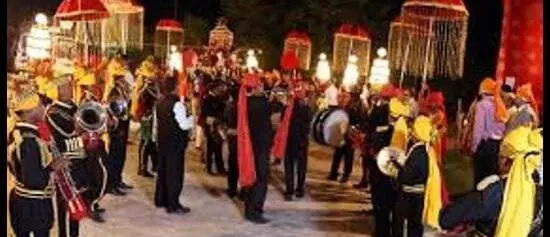
Police direct muslims in Moradabad not to name wedding bands after Hindu deities
text_fieldsPolice in Uttar Pradesh’s Moradabad have directed Muslim wedding band operators to stop using names of Hindu deities for their businesses, according to a report by the Hindustan Times.
The order came after a complaint was filed on the chief minister’s portal by lawyer Shaby Sharma on July 9, alleging that around 15 to 20 Muslim band operators in the district were operating under names associated with Hindu gods. The complaint claimed that this practice was hurting religious sentiments.
Superintendent of Police (City) Kumar Ranvijay Singh told Amar Ujala that several band operators were summoned on Tuesday and instructed to remove such names. He added that the operators had agreed to comply with the directive, Scroll.in reported.
The complainant, Shaby Sharma, told the Hindustan Times that the wedding band business in Moradabad is predominantly run by Muslims, yet many of these establishments operate under Hindu names, including those of gods and goddesses. He alleged that this was “an attempt to distort identity” and claimed that Chief Minister Yogi Adityanath himself had called for action against such practices.
Sharma clarified that the police action following his complaint should not be seen as discrimination but rather as a “legal measure.”
This development comes a month after the Uttar Pradesh and Uttarakhand governments directed eateries along the Kanwar Yatra pilgrimage route to display QR codes revealing the owners’ identities.
The directive was later challenged in the Supreme Court, where a counsel for the Uttarakhand government reportedly stated that the real concern was about dhabas named after Hindu deities, such as “Shiva Dhaba” or “Parvati Dhaba,” being operated by Muslims.
On July 22, the Supreme Court declined to review the legality of the directives issued by the Uttar Pradesh and Uttarakhand governments, which required eateries along the Kanwar Yatra route to display QR codes revealing their owners’ identities.
Similar directives had been issued earlier in 2024 by the Uttar Pradesh government. At that time, the police in Muzaffarnagar stated that the measure was intended to “avoid confusion” among devotees travelling on the pilgrimage route.
However, in July 2024, the Supreme Court passed an interim order prohibiting authorities from compelling vendors to disclose their identities.












